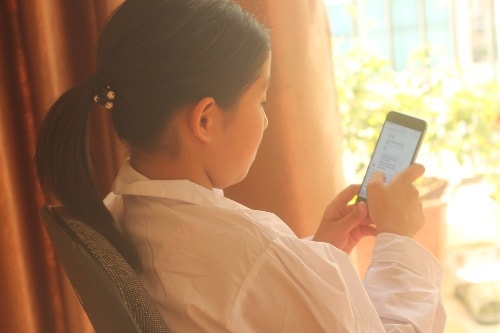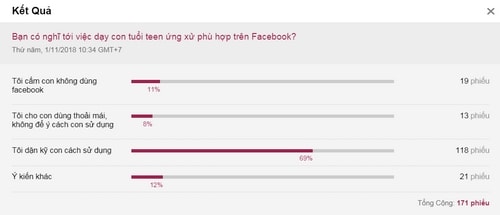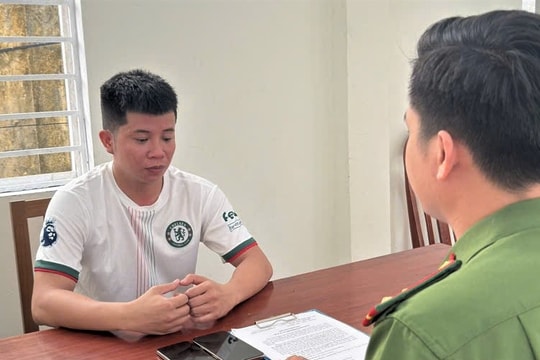Situations parents don't expect when children use Facebook
Eavesdropping on her 7th grade daughter's chat, Ms. Ha was shocked to see the well-behaved, studious girl swearing and gossiping about sex.
Taking her daughter, who looks quite gentle and reserved, to the psychological counseling center, Ms. Nguyen Thi Ha (Hai Duong) said that her daughter has been an excellent student since she was little and is the class monitor. A few weeks ago, the teacher informed her that recently her daughter often holds hands and hugs a male classmate. One time, the whole class went on a picnic, and the two of them even went out on their own.
When asked indirectly, the child did not tell, and seeing that the child was always buried in his phone, Ms. Ha secretly looked at the child's personal page and was shocked to see chats with a group of classmates. In it, the children, including her daughter, said extremely vulgar words, and talked about this child sleeping with that child, about relationships and love affairs that would make adults feel embarrassed.
"I didn't dare say I knew what happened, afraid that she would go crazy. I tried to talk to her but she wouldn't say anything. I was afraid that if this continued, she would be ruined," Ms. Ha confided.
Ms. La Linh Nga, director of the Center for Research and Application of Psychological and Educational Sciences (Pho Vong, Hanoi), said that after talking to Ms. Ha's child - a gentle, unhurried girl, and reading the chat messages her mother showed her, she was quite surprised. The girl initially appeared very defensive, but then gradually began to share. She said that because she saw her friends all swearing when chatting, she imitated them, found it interesting and gradually got used to it. For them, Facebook is a world where they can say and do whatever they want because no one knows. They do not anticipate the danger if someone reads these things.
Ms. La Linh Nga said that many parents were shocked to learn about the content their children chatted and shared on Facebook. It could be very vulgar, not age-appropriate, and very different from how their children expressed themselves in real life. Children have not yet realized the real dangers of the virtual world. Words are fleeting, but words can affect the psychology, life, and even the lives of others.
|
Using Facebook at a young age can expose children to many online pitfalls. Photo:MT. |
Ms. Nga illustrated this with a school she had consulted a few months ago. A 15-year-old girl named Ngoc, from Ha Dong, Hanoi, was brought here by her mother because she had cut her wrists several times. When her parents asked, she did not give a reason. Before that, Ngoc was a cheerful, good student and was loved by many friends because she was gentle.
After talking to the psychologist, Ngoc said that for the past two weeks, several close friends have been sending her photos of chats between several groups of classmates. The content of the discussions was badmouthing Ngoc, making up stories about her having sex with many boyfriends. "I feel so sad and angry, I don't want to go to school anymore and I want to die," Ngoc said.
After being listened to and advised, along with her parents asking friends and teachers to secretly influence her, Ngoc returned to school with a more positive mood.
"Skills in using social networks, choosing news and content to share... are extremely important, but even adults do not fully understand them, so they do not guide children at all, making them vulnerable to unexpected dangers," said Ms. Linh Nga.
The most worrying thing, according to her, is that nowadays, too many parents let their children use cell phones freely from a young age.When parents see their children are too absorbed in devices and negatively influenced by social networks, they frantically try to stop them but are met with fierce resistance from their children.
According to psychologists, parents need to guide their children to know the benefits and dangers of social networks, how to choose friends, interactive pages, and use appropriate language... When creating an account for children, it is necessary to agree with them on the rules of use from the beginning, such as not bringing the phone to their own room, and having to hand over the phone to their parents before going to bed...
"In many cases, parents do not control their children, they use their phones to surf the internet, chat until 2-3am, and during the day they neglect and skip school," said Ms. Nga. According to experts, when children are more mature - in high school or when parents truly trust their ability to manage themselves, then they can loosen up.
|
A quick survey of 170 parents showed that 8% of parents let their children use Facebook freely, without any control over their use. This can easily lead to children receiving incorrect information from the community. |
Sharing the same opinion, Master of Psychology Pham Duc Chuan, Center for Research on NT Psychology (Huynh Thuc Khang, Hanoi) said,In developed countries, although parents respect children's privacy, they always strictly control their children's use of phones and social networks.Software that limits time and content is installed directly on devices. Children's devices are even connected to their parents' computers.
Mr. Chuan said that many Vietnamese parents have not yet anticipated the dangers lurking when allowing their children to use phones and Facebook, especially young children.
He shared a case with a client who was a 5th grade boy.
Nhan, a boy, liked a girl in his class and created a Facebook account on his iPad to chat with her. Nhan confessed his feelings, promising that when he grew up he would get married, earn a lot of money to buy gifts and a house for his "wife". He also named other girls who liked him, but "I only love you".
Unexpectedly, the girl took a screenshot of all the chats and sent them to her friends. The story spread throughout the class. The boy was embarrassed by the teasing and insisted on transferring schools, but did not give a reason. Finally, the parents agreed to the child's request to go to a counseling center.
"If you tell me this story, I have to promise to keep it a secret and tell you how to convince my parents to transfer me to another school," the boy promised.
According to experts, one factor that makes children easily drawn into the virtual world is the lack of real connection in the family. "Like in the case of Nhan, if the parents are close enough for the child to trust, the child can completely share the problems he/she encounters with his/her parents, without needing to seek help from a psychologist," Mr. Chuan shared.
*The names of some characters in the article have been changed.




.jpg)





